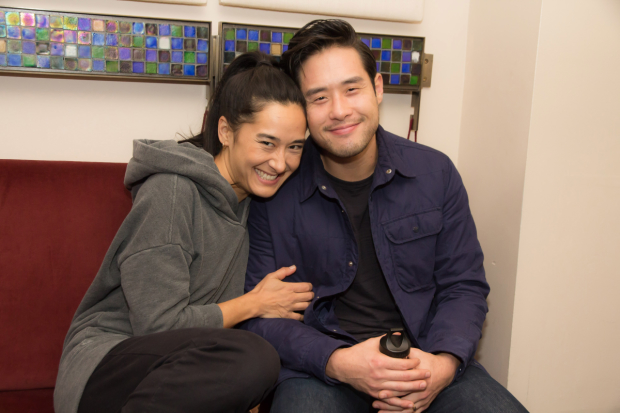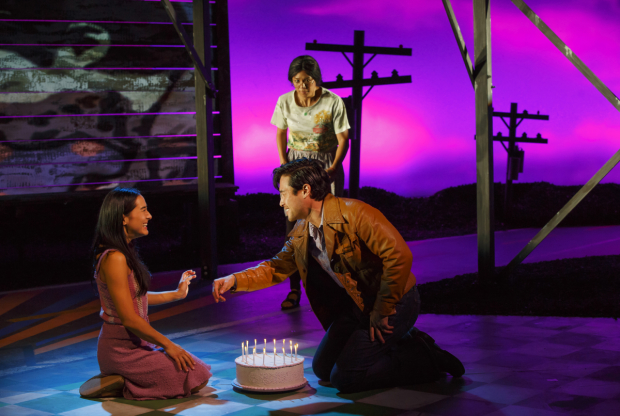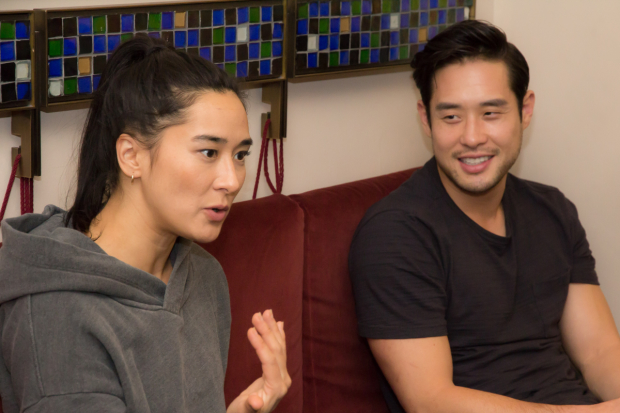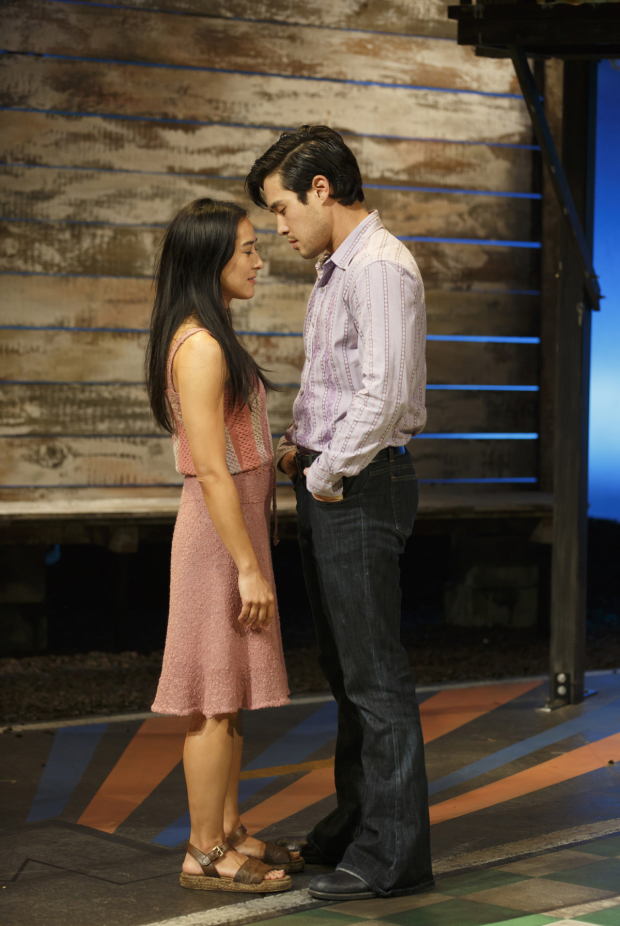Jennifer Ikeda and Raymond Lee Go Big in Qui Nguyen's Vietgone
The play’s leading lovers discuss the physical, linguistic, and mental acrobatics demanded by MTC’s newest offering.

(© Seth Walters)
"I've got some battle wounds on my legs — bruises," laughs Jennifer Ikeda, star of Qui Nguyen's new play Vietgone. "I'm like Pratfall McGee in this show, doing physical bits with the suitcases or being pushed off the bed."
"Qui expects for his performers to be at his level," adds her costar Raymond Lee, referring to their playwright's extensive experience as a fight director (while co-artistic director of Vampire Cowboys). Lee continues with a slightly sarcastic grin: "He'll say, 'Just do this cartwheel here and then do a forward role.' "
According to the pair, physical agility isn't the only type of flexibility that Nguyen, a writer for Marvel Studios, expects of his actors. Nguyen's newest play, which takes an irreverent look at his own parents' stories as Vietnam War refugees, also demands linguistic and even mental dexterity. In addition to featuring rapped interludes, Vietgone utilizes a unique language structure in which the Vietnamese protagonists speak better English than the Americans.
But perhaps the biggest leap Vietgone asks of its actors and audiences is that of reconsidering America's negative cultural narrative about the Vietnam War. Toward the end of the play, the character of Quang (Nguyen's father) communicates his frustration at his second-generation Vietnamese-American son's dismissal of the conflict: "When your house is on fire and you lose everything, you do not want to hear from your neighbor that moving into the house was mistake in first place. You especially don't want to hear that the men and women who helped fight that fire were mistakes as well."

(© Carol Rosegg)
Were you surprised by the play's representation of the Vietnam War?
Raymond: It completely uprooted my idea of what I thought about the Vietnam War. That stuff wasn't in the history books that I read growing up. The first time we ever read this play out loud, we just kind of had to pause for a moment because we knew that we'd just been rocked. Like, they need to rewrite the history books now. It's crazy to think about how frustrating it must have been to all these people who are having to sit in history classes and think, "Dude, that wasn't my parents' story." And I hope if the audiences can walk away with anything, it's that perspective.
Jennifer: A conflict that's that acrimonious. I think that there wasn't really time or space for a national conversation — or any kind of conversation — about: What does this war actually mean? Why are we fighting? Who are we fighting for? Who are the people actually being affected by this every day? I think that Qui has given voice to many of those people through this play.

(© Seth Walters)
How important are Qui's language choices in the play?
Raymond: Language is really powerful. If we are limited in what we can say, then you are stripping us of our power.
Jennifer: Before rehearsals started, I said something to Qui about being slightly nervous that I'm not Vietnamese at all, and his response was basically: That's not why he wrote this play. That's not what he wants out of this play. What he wanted, he said, was for the 14-year-old version of himself to go see a play with Asian-American people onstage and to walk away saying those people are f***ing cool, they're sexy, they're smart. I want to be like them and so does everybody in this audience. And I think giving us that sort of freedom and facility with language is one of the first ways to accomplish that. It's so much more playful — especially having the raps in there — it sets up a heightened nature of the language.
How does rap enhance the play's storytelling?
Raymond: It works in the same way as in musicals where if you can't possibly express any more with words, you have to do it with music. Qui has some great musical influences, and he infused that into the show. It's really cool because it's not a musical. It's just his way of getting out emotions.
Jennifer: I was terrified to rap at first, but people said to me, "Oh, you've done a lot of Shakespeare, that'll be really helpful." And I thought, "Nah, it's not like Shakespeare, it's not the same." But it really is. It is absolutely like Shakespeare because when you've gotten to that place where you can't say this with words anymore, you need to enter another mode of communication. And it's that intelligence and that playfulness that I think is like really what makes it fun at the end of the day — makes you dig into it, and keep digging into it.
Have you struggled with lack of opportunities for minority actors?
Jennifer: Of course. It's something that's always tricky to talk about because on the one hand I am so fortunate to have had the career that I've had. And I'm truly grateful for every single one of those opportunities. But there are always reminders that no matter what my résumé is, there is still a wall, particularly with Asian Americans, that has not been pierced — which is what I think this play does so effectively.
Raymond: Speaking from the perspective of an Asian male actor, we're not really encouraged to be leading men — because if we sought out to be leading men, we would be out of a job a lot of the time. There are not opportunities for us in that way. So in order for us to survive, we find our way to becoming the joker best friend — or someone who is definitely not sought after sexually, which is completely castrating for us. And we kind of do it unknowingly because we're like, "Oh, this is what I have to audition for? OK. Liquor Store Guy Two who gets yelled at by the main guy? OK, that's fine." In order for us to survive we have to get good at those roles and it perpetuates itself over and over, but it's a matter of survival. If we really want to be an actor, let's try to get into that mold and be the best sidekick possible. But no, what if we want to be a leading man? So, thank you, Qui.
Jennifer: Yes, it features Asian people, but what this play is really about is people who in light of all of the chaos and all of the obstacles in our way, in spite of the fact that we might be going through hell, there are people who rage against that and who run towards joy and choose not to stay at rock bottom. I choose to live — and to not just live, but to f***ing dance. And that to me, getting to some kind of like beautifully universal kernel of an idea like that, is what makes pieces transcendent.
Raymond: That's why I think we give so much to this play and we get hurt, because we know, we have the responsibility of telling such an important story.

(© Carol Rosegg)










